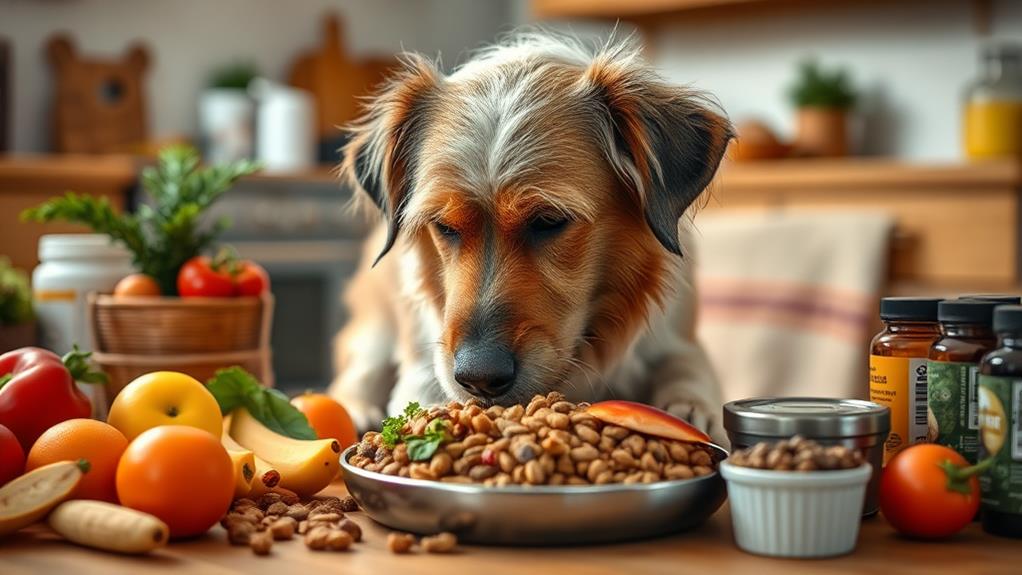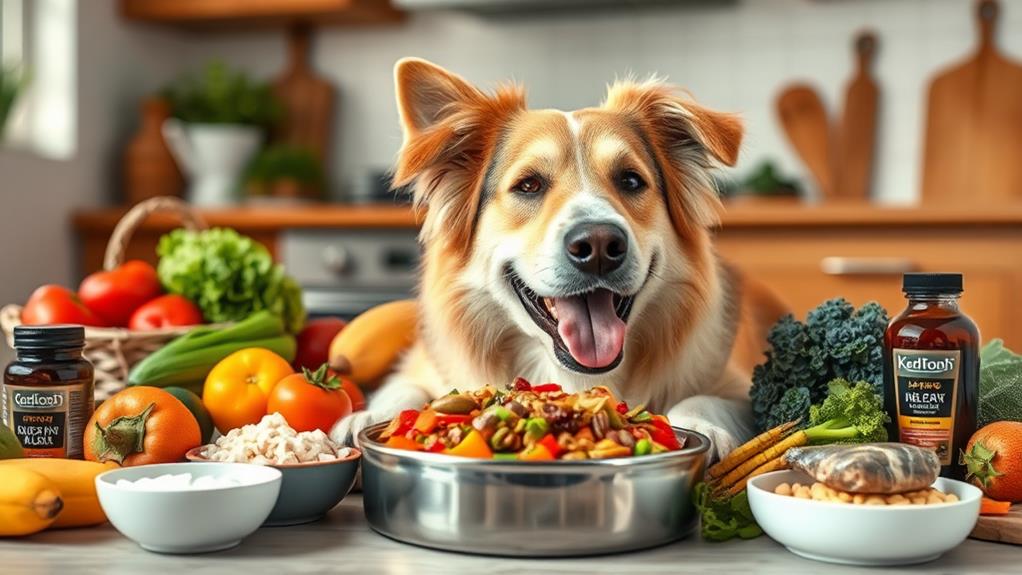Optimizing your senior dog's diet is essential for their health and well-being. Guarantee they get enough protein to maintain muscle mass and consider the right balance of fats for energy and skin health. Incorporate fiber-rich foods to support digestion, and keep sodium and phosphorus levels low for kidney health. Don't forget hydration—fresh water is a must! Gradually introduce new foods and consult your vet for personalized recommendations. Remember to monitor their weight and adjust portions as needed. There's so much more you can do to enhance their nutrition and quality of life.
Understanding Senior Dog Nutritional Needs

As dogs age, their nutritional needs change dramatically, much like a well-tuned instrument that requires occasional adjustments to maintain its sound. You might notice that your senior dog isn't as active or energetic as they once were, which means their dietary requirements shift. It's indispensable to reevaluate their food to ensure it aligns with their current lifestyle and health.
Senior dogs often need fewer calories since their metabolism slows down. However, it's imperative to ensure they still receive balanced nutrition to support their overall health. Their bodies may become less efficient at absorbing nutrients, so focusing on high-quality ingredients is critical. You should also consider their dental health, as older dogs may face challenges in chewing and digesting certain types of food.
Hydration is another key factor; older dogs may be prone to dehydration, so always provide access to fresh water. Pay attention to any specific health issues your dog might have, such as arthritis or kidney problems. Adjusting their diet accordingly can make a significant difference in their comfort and wellbeing. By understanding these changes, you're taking an important step in enhancing your senior dog's quality of life.
Key Nutrients for Aging Dogs

Senior dogs require specific nutrients to support their changing bodies and maintain their health. One essential nutrient is protein, which helps preserve muscle mass and supports overall body function. Look for high-quality protein sources, such as chicken, fish, or eggs, in your dog's diet.
Another key nutrient is omega-3 fatty acids. These healthy fats promote joint health and reduce inflammation, which is especially important as your dog ages. Incorporating fish oil or flaxseed oil can boost your dog's omega-3 intake.
Antioxidants, like vitamins C and E, play a pivotal role in neutralizing free radicals and supporting the immune system. Foods rich in fruits and vegetables, such as blueberries and spinach, can provide these indispensable nutrients.
Fiber is also important for senior dogs, as it supports healthy digestion and can help maintain a healthy weight. Look for diets that include sources like sweet potatoes or beet pulp.
Lastly, make sure your dog's diet is balanced with essential vitamins and minerals to support overall health. By focusing on these key nutrients, you can help your senior dog stay active, healthy, and happy in their golden years.
Adjusting Caloric Intake

Adjusting your senior dog's caloric intake is essential for maintaining a healthy weight and overall well-being. As dogs age, their metabolism slows down, which means they require fewer calories than they did in their younger years. To determine the right amount, start by consulting with your veterinarian. They can provide guidelines based on your dog's breed, size, activity level, and health conditions.
When adjusting their diet, monitor your dog's weight regularly. If you notice they're gaining weight, reduce their daily caloric intake. Conversely, if they're losing weight, you might need to increase it. It's indispensable to make these changes gradually to avoid digestive upset.
Consider switching to a senior-specific dog food, as these formulas are often lower in calories and designed to meet the unique nutritional needs of older dogs. When feeding, break their meals into smaller portions throughout the day to help manage hunger and maintain energy levels.
Lastly, always keep an eye on your dog's body condition score. Maintaining a healthy weight won't only improve their quality of life but also contribute to a longer, happier life.
Importance of Hydration

Maintaining a healthy weight is just one aspect of your senior dog's overall health; hydration plays an equally critical role. As dogs age, they may become less aware of their thirst, leading to dehydration. This can affect their organ function, digestion, and overall well-being. Keeping your senior dog hydrated is essential for their longevity and quality of life.
Factors Influencing Hydration | Recommended Water Intake | Signs of Dehydration
——————————-|————————–|———————-
Size of the dog | 1 ounce per pound daily | Dry gums
Activity level | More for active dogs | Lethargy
Diet type | Wet food provides moisture| Loss of skin elasticity
To encourage hydration, always have fresh water available, and consider incorporating wet food into their diet. Adding water to dry kibble can also help. Keep an eye on their drinking habits, and if you notice any changes, consult your vet to ensure your furry friend stays happy and healthy. Remember, proper hydration is crucial for your senior dog's overall health!
Choosing High-Quality Ingredients

When it comes to your dog's diet, choosing high-quality ingredients is crucial for their health and well-being. Senior dogs have unique nutritional needs that require you to pay extra attention to what goes into their food.
Start by selecting dog food that lists real meat as the first ingredient. This safeguards that your dog gets the protein they need for muscle maintenance.
Look for whole food ingredients like sweet potatoes, brown rice, and vegetables. These sources of carbohydrates provide energy without the empty calories found in fillers like corn or soy. Avoid artificial additives, preservatives, and colors, as they can lead to health issues over time.
It's also worth checking the source of the ingredients. Opt for brands that prioritize human-grade ingredients or those sourced from reputable suppliers. Transparency in sourcing indicates a commitment to quality and safety.
Supplements for Senior Dogs

As your senior dog ages, incorporating the right supplements into their diet can make a significant difference in their overall health. Many senior dogs experience joint stiffness, so glucosamine and chondroitin supplements can be particularly beneficial. These ingredients help support cartilage health and promote mobility, making your dog more comfortable.
Omega-3 fatty acids are another great addition, as they can reduce inflammation and support skin and coat health. If your dog struggles with cognitive decline, consider supplements containing antioxidants or DHA, which may improve brain function and memory.
Probiotics can also play a pivotal role in maintaining digestive health, especially since senior dogs often face gastrointestinal issues. These beneficial bacteria help balance gut flora and improve nutrient absorption.
Before introducing any supplements, it's imperative to consult your veterinarian. They'll help you determine the right options and dosages based on your dog's specific needs. Remember, supplements are intended to complement a balanced diet, not replace it. By carefully choosing the right supplements, you can enhance your senior dog's quality of life and keep them happy and healthy for years to come.
Transitioning to a New Diet

Moving your senior dog to a new diet can be a sensitive process, especially if they're accustomed to their current food. It's crucial to approach this shift gradually to minimize digestive upset and guarantee your dog accepts the change. Start by mixing a small amount of the new food with their old food. Aim for about 25% new food to 75% old food at first.
Over the next week, gradually increase the proportion of new food while decreasing the old food. By the end of the week, you should aim for a 100% change. Monitor your dog closely during this period for any signs of discomfort, such as diarrhea or vomiting. If you notice any issues, slow down the change process.
Be patient and offer praise during mealtime to encourage your dog. You might also want to warm the new food slightly or mix in some low-sodium broth to make it more appealing. Remember, each dog is unique, so adjust the pace of the change according to your dog's needs. By taking it slow, you'll help your senior dog embrace their new diet with ease and confidence.
Frequently Asked Questions
How Can I Identify My Senior Dog's Food Allergies?
To identify your senior dog's food allergies, start by monitoring their reactions after meals. Look for symptoms like itching, digestive upset, or changes in behavior. Keep a food diary to track patterns and consult your vet for guidance.
Are Homemade Diets Suitable for Senior Dogs?
Yes, homemade diets can be suitable for senior dogs, but you need to guarantee they're balanced and meet your dog's specific nutritional needs. Consulting a vet or pet nutritionist is pivotal before making changes.
Can Senior Dogs Eat Human Food Safely?
Your senior dog can safely enjoy some human foods, but it's like giving them a gourmet feast! Always check for harmful ingredients, and consult your vet to verify their diet remains balanced and healthy.
What Signs Indicate My Dog Needs a Dietary Change?
If your dog shows signs like weight gain, lethargy, digestive issues, or changes in coat quality, it's time to reassess their diet. Keep an eye on their energy levels and overall health for necessary adjustments.
How Do Dental Issues Affect My Senior Dog's Nutrition?
Dental issues can lead to pain, making it hard for your senior dog to chew. This discomfort might cause them to eat less or avoid certain foods, impacting their overall nutrition and health.
Conclusion
In the journey of your senior dog's golden years, think of nutrition as a warm blanket, wrapping them in comfort and vitality. By understanding their unique needs and adjusting their diet, you can help them thrive. It's like fine-tuning a classic car; with the right fuel and care, they can still run smoothly. Embrace this opportunity to nourish their body and soul, ensuring each wag of their tail is a celebration of your love and attention.



